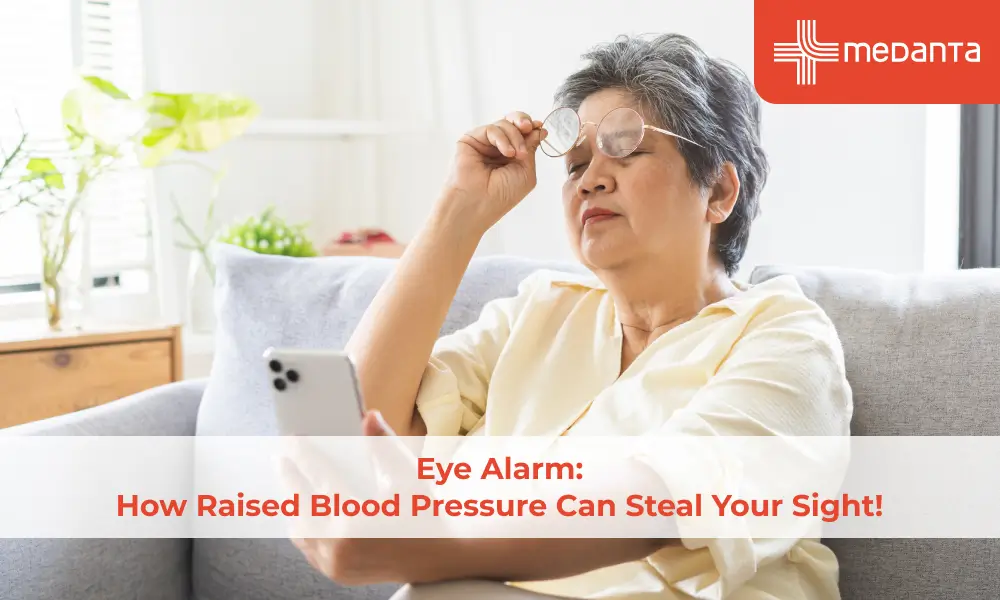Eye Alarm: How Raised Blood Pressure Can Steal Your Sight!

TABLE OF CONTENTS
High blood pressure, also known as hypertension, can pose a significant threat to your vision. If left unchecked, hypertension increases the risk of various conditions that may harm your eyesight. Maintaining proper control of your blood pressure not only reduces the chances of vision-related issues but also mitigates the likelihood of heart disease, stroke, kidney damage, and other critical health complications.
In this blog, we’ll talk about how elevated blood pressure can adversely affect your eyes and overall visual health.
How Can Raised Blood Pressure Steal Your Sight?
Most people don’t think about their eyes when it comes to their blood pressure, but there are actually several indicators of hypertension that medical professionals can detect during an eye exam. Here's how raised blood pressure can affect your sight:
Hypertensive Retinopathy: Persistent high blood pressure can damage the blood vessels in the retina, the light-sensitive tissue at the back of the eye. This condition, known as hypertensive retinopathy, can lead to vision problems or even vision loss if left untreated.
Narrowing of Blood Vessels: Elevated blood pressure can cause the blood vessels in the retina to narrow, reducing blood flow to the eye and causing damage to the retinal tissue.
Fluid Leakage: Increased pressure in the blood vessels can result in fluid leakage into the retina, leading to swelling and distortion of vision.
Optic Nerve Damage: High blood pressure can also affect the optic nerve, which transmits visual information from the retina to the brain. Damage to the optic nerve can result in irreversible vision loss.
Risk of Retinal Detachment: In severe cases of hypertensive retinopathy, the retina may detach from the back of the eye, leading to sudden and significant vision loss.
Other Eye Conditions: Raised blood pressure is also associated with an increased risk of other eye damage conditions such as glaucoma and macular degeneration, which can further compromise vision.
Importance of Regular Eye Exams: Regular eye examinations are essential for detecting early signs of hypertensive retinopathy and other eye conditions associated with high blood pressure. Timely intervention and management of blood pressure levels can help preserve vision and prevent irreversible damage.
The Link Between Hypertension and Retinal Damage
Hypertension, or high blood pressure, poses a direct threat to the delicate structures of the eye, particularly the retina. This connection, known as hypertensive retinopathy, stems from the strain imposed on the retinal blood vessels by elevated blood pressure levels. Over time, this strain weakens the vessel walls, leading to a cascade of adverse effects including vessel narrowing, leakage, and even haemorrhage.
Such changes compromise the blood supply to the retina, depriving its cells of vital oxygen and nutrients essential for proper function. As a result, individuals with uncontrolled hypertension are at an increased risk of developing vision-related complications such as blurred vision, visual disturbances, and even permanent vision loss.
Early detection through regular eye exams and proactive management of hypertension are paramount in preserving ocular health and mitigating the potentially devastating consequences of hypertensive retinopathy.
Hypertensive Retinopathy Symptoms and Diagnosis
One of the insidious aspects of hypertensive retinopathy is its often asymptomatic nature, particularly in its early stages. Here are the symptoms and diagnosis of hypertensive retinopathy:
Asymptomatic in Early Stages: Hypertensive retinopathy often presents no symptoms, especially in its initial phases, making regular eye exams crucial for early detection.
Visual Disturbances: As the condition progresses, individuals may experience blurred vision, difficulty focusing, or visual field abnormalities.
Headaches: Persistent headaches, particularly those localised around the temples, can be indicative of hypertensive retinopathy and should prompt further evaluation.
Floaters or Flashes of Light: Patients may notice floaters—dark spots or strings drifting in their field of vision—or flashes of light, which could indicate retinal changes associated with hypertension.
Retinal Examination: Diagnosis typically involves a comprehensive dilated eye examination by an ophthalmologist or optometrist to assess the retina's health and detect any signs of hypertensive retinopathy.
Retinal Imaging: Advanced imaging techniques such as fundus photography, optical coherence tomography (OCT), and fluorescein angiography may be employed to visualise and evaluate the retinal blood vessels and detect abnormalities.
Blood Pressure Monitoring: Concurrent monitoring of blood pressure levels is essential for correlating hypertensive retinopathy with systemic hypertension and guiding appropriate management strategies.
Complications and Consequences
The ramifications of untreated hypertensive retinopathy extend beyond mere vision impairment. Advanced stages of the condition may precipitate serious complications, including retinal haemorrhage, macular edema, and even retinal detachment, all of which can culminate in permanent vision loss. Beyond the physical toll, the psychological and emotional impact of compromised vision cannot be overstated, significantly diminishing one's quality of life.
Hypertensive Retinopathy Prevention and Management
Preventing hypertensive retinopathy begins with diligent management of blood pressure levels. Lifestyle modifications, including a balanced diet, regular exercise, and stress reduction techniques, serve as cornerstones of hypertension management.
For individuals with hypertension, adherence to prescribed medications and routine monitoring are imperative to prevent the onset or progression of retinal damage.
Hypertensive Retinopathy Treatment and Support
If you suspect you have hypertension or experience changes in your vision, seeking prompt medical attention is paramount. Eye care professionals, equipped with specialised tools and expertise, can assess the health of your retina and formulate a tailored treatment plan to mitigate further damage.
Additionally, support networks and resources exist to assist individuals navigating the complexities of hypertension and its ocular manifestations.
Final Thoughts
In the realm of health and wellness, the eyes serve as windows to our overall well-being. The intimate connection between hypertension and retinal damage underscores the importance of proactive measures in safeguarding our vision.
By prioritising blood pressure control, embracing healthy lifestyle habits, and remaining vigilant about our ocular health, we can stem the tide of silent threats and preserve the precious gift of sight for years to come. High blood pressure can impact your eyes, so consult a reputed and skilled ophthalmologist at your nearest tertiary care hospital if necessary!






